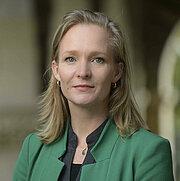Panel discussion: How to regulate digital transformation?
The Centre for Digital Governance aims to improve the public well-being by conducting academically rigorous research, providing world-leading education, and contributing societally relevant policy insight on the challenges and opportunities of digital transformation. To celebrate the launch of the Centre, a two-part event series has been organised that explores the challenges of digital transformation. The first event asks the question “How to regulate digital transformation?”; the second event will take place on the October 29 and explores the interconnection between digitalisation and sustainability. Stay tuned for more information about the work of the Centre by joining our mailing list.
On October 12, we will discuss the criticism directed at tech companies for their perceived lack of effort at controlling the negative effects of the internet, and their response to this that it is rather governments who should be in charge of regulation. Under the German Presidency, the European Union will make crucial decisions that will shape the development of a European model for digital governance. How does the European approach differ from the roads taken by the United States and China, and how can decision-making in the digital realm be coordinated in Europe such that it fosters public well-being?
Join us as we debate the current and future challenges of regulating digital transformation. This panel discussion will follow after a fireside chat hosted by the European Movement Germany with Margrethe Vestager, European Commission Executive Vice-President and European Commissioner for Digitalisation and Competition, titled Digital Transformation of Europe - State of Play.
Welcome

Mark Hallerberg is Deputy President and Dean of Research and Faculty as well as Professor of Public Management and Political Economy at the Hertie School. His research focuses on fiscal governance, tax competition, financial crises, and European Union politics. He previously held academic positions at Emory University, where he maintains an affiliation with the political science department, as well as at the University of Pittsburgh and Georgia Institute of Technology.
Panel discussion

Prabhat Agarwal is currently working on the European Commission's policies and regulation in the field of online platforms and electronic Commerce. He comes from a background of academic and industrial research. He joined the European Commission in 2007, and has since then covered a variety of digital innovation and regulatory areas, as well as foresight. His particular interest lies at the intersection of science, technology, society, and the law.

Marietje Schaake is the international policy director at Stanford University’s Cyber Policy Center and international policy fellow at Stanford’s Institute for Human-Centered Artificial Intelligence. She was named President of the Cyber Peace Institute. Marietje served as a Member of European Parliament for the Dutch liberal democratic party where she focused on trade, foreign affairs and technology policies. Marietje is affiliated with a number of non-profits including the European Council on Foreign Relations and the Observer Research Foundation in India and writes a monthly column for the Financial Times and a bi-monthly column for the Dutch NRC newspaper.

Daniela Stockmann is Professor of Digital Governance at the Hertie School. Her current research focuses on platform regulation in the United States, China, and Europe. Her most recent project, funded by a Starting Grant of the European Research Council, explores the impact of the technological design of social media platforms on user behaviour regarding politics in China. Beyond her academic work, she has served as advisor to the Ministry of Foreign Affairs in the Netherlands and to German President Steinmeier during his 2018 visit to China.
Moderator

Lisa Witter is the co-founder and executive chair of Apolitical. She is a World Economic Forum Young Global Leader, co-chairs the Forum’s Council on Agile Governance, and served for six years on the Brain and Behavior Council. She is a serial entrepreneur, author, and former public servant with deep experience in politics, policy, and behavioral science. As a policy geek and lover of politics and democracy, she has co-founded several political training institutes over the last 25 years including the Apolitical Academy. She was recently awarded, along with her co-founder Robyn Scott, the 2020 Creative Bureaucracy Award.



